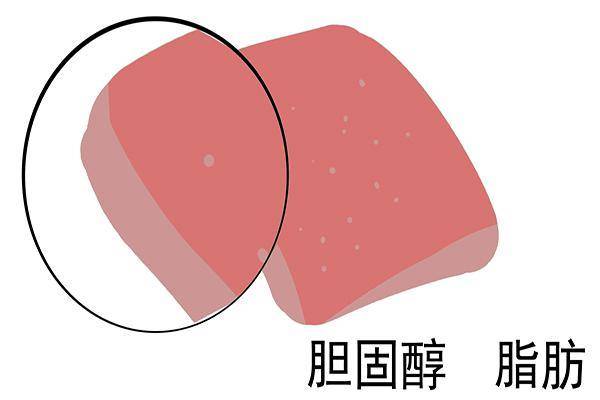Introduction: The problem of the three highs has become a common chronic disease in our country, threatening the health of the Chinese people. When it comes to high blood lipids, people also tend to associate it directly with obesity and not being able to eat meat. Some even believe that “cholesterol” is the main culprit for many diseases. However, in fact, there may be some misconceptions about cholesterol among the general population.
Several decades ago, living conditions were relatively poor, people often couldn’t afford to eat meat, and there was no oil in their meals. As living conditions gradually improved, there was more chicken, fish, meat, and eggs on the table, people could eat well. However, some people found that as living conditions improved, they were more prone to getting sick, with risks of high blood lipids, coronary heart disease, and more.
Some attribute the increasing risk of disease to the rising cholesterol levels in food. Therefore, the Chinese Dietary Guidelines once limited the total amount of cholesterol intake per person per day to not exceed 300 milligrams. Many people believe that this restriction is reasonable and can reduce the risk of diseases.
As an essential nutrient in the human body, cholesterol is crucial for the absorption of vitamins, hormone synthesis, monomer synthesis, and cell synthesis. When the body maintains a normal level of cholesterol, it can promote the liver’s synthesis of fatty acids, thereby stabilizing the body’s fat levels.
Moreover, cholesterol can be divided into two types: high-density lipoprotein cholesterol and low-density lipoprotein cholesterol. The former is considered good cholesterol, as it not only does not raise cholesterol levels in the body but also helps regulate cholesterol levels in the body and assists in metabolizing the “low-density lipoprotein cholesterol.”
On the other hand, when the level of the latter keeps rising, it may lead to the accumulation of lipid plaques on the blood vessel walls, and as the plaques increase in size, they can directly damage the blood vessels, gradually narrowing them and posing a threat to health.
From these perspectives, cholesterol is not a bad thing. As long as people can control it within a certain range, it can be beneficial to health.
Next, I will share some common misconceptions about cholesterol to see if you have fallen into any.
Misconception 1: To lower lipid levels, one must stop eating meat
Some people believe that the main reason for high cholesterol is excessive meat consumption. To lower blood lipids, the first thing to do is to stop eating meat. However, what people may not know is that cholesterol in the body mainly comes from two sources: internal synthesis and external intake. Internal synthesis accounts for about 70%, while ingested cholesterol from food accounts for only about 20% to 70%.
The method of not eating meat to lower blood lipids can only reduce the externally ingested cholesterol and cannot control the body’s synthesis of cholesterol. The correct approach is “reducing intake and increasing expenditure.” Metabolize excess cholesterol through a dual guarantee of exercise and diet control to stabilize blood lipids.
Misconception 2: Eggs have high cholesterol, so people with high blood lipids should not eat them
Many middle-aged and older adults say they dare not eat eggs because they have heard that one egg contains 150 grams of cholesterol. They are afraid that a high-cholesterol diet might cause fluctuations in blood lipids. However, in my opinion, this concern is unnecessary.
Although eggs contain some cholesterol, they also contain abundant phospholipids, vitamins, and other nutrients that can help lower cholesterol levels. Essentially, although eggs have a relatively high cholesterol content, they can balance this cholesterol level on their own. For individuals with high blood lipids, eating an egg a day as a source of protein is a good choice.
Misconception 3: The lower the low-density lipoprotein cholesterol, the better
Since low-density lipoprotein cholesterol in cholesterol is considered bad and poses a threat to blood vessel health, isn’t it better for it to be lower?
For different populations, healthy cholesterol indicators vary. For example, healthy individuals and those at low risk of coronary heart disease should aim to keep low-density lipoprotein cholesterol levels below 3.4. Those at higher risk need to stabilize it below 2.6. For patients with stroke or coronary heart disease, it’s best to keep it below 1.8 to better protect cardiovascular health.
However, it’s essential to note that a too low level of low-density lipoprotein cholesterol is not optimal. When the low-density lipoprotein level falls significantly below the normal value, doctors may suspect liver synthesis dysfunction, malnutrition, and even in patients with a significant loss of weight, they may suspect malignancy.
In other words, having excessively low levels of low-density lipoprotein cholesterol poses a health risk. However, don’t blindly pursue reducing levels just to lower blood lipids, as this may be indicative of underlying health issues.
Overall, for individuals with high blood lipids and older adults, the practice of avoiding meat and eggs due to fears of increased cholesterol might be exaggerated. People should have a proper understanding of the importance of cholesterol and learn how to stabilize cholesterol levels in the body through scientific methods. Have you fallen into any of these cholesterol misconceptions mentioned above? If identified, timely adjustments should be made to protect health.
Conclusion: From a perspective of human health, cholesterol is just a nutrient. It’s only when external factors influence the body, causing cholesterol levels to abnormally rise, that diseases like high blood lipids may be triggered. What people need to do is to have a correct understanding of cholesterol and use appropriate methods to lower lipids, stabilize blood lipids, and protect cardiovascular health.


